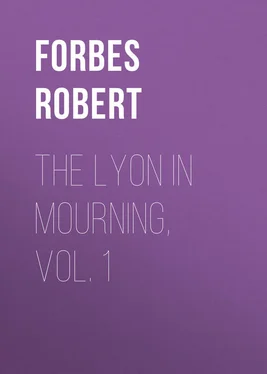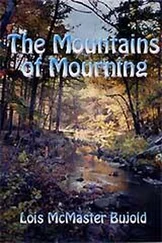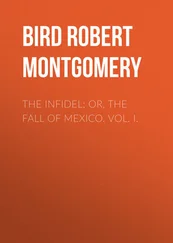Robert Forbes - The Lyon in Mourning, Vol. 1
Здесь есть возможность читать онлайн «Robert Forbes - The Lyon in Mourning, Vol. 1» — ознакомительный отрывок электронной книги совершенно бесплатно, а после прочтения отрывка купить полную версию. В некоторых случаях можно слушать аудио, скачать через торрент в формате fb2 и присутствует краткое содержание. Жанр: foreign_antique, foreign_prose, Биографии и Мемуары, на английском языке. Описание произведения, (предисловие) а так же отзывы посетителей доступны на портале библиотеки ЛибКат.
- Название:The Lyon in Mourning, Vol. 1
- Автор:
- Жанр:
- Год:неизвестен
- ISBN:нет данных
- Рейтинг книги:3 / 5. Голосов: 1
-
Избранное:Добавить в избранное
- Отзывы:
-
Ваша оценка:
- 60
- 1
- 2
- 3
- 4
- 5
The Lyon in Mourning, Vol. 1: краткое содержание, описание и аннотация
Предлагаем к чтению аннотацию, описание, краткое содержание или предисловие (зависит от того, что написал сам автор книги «The Lyon in Mourning, Vol. 1»). Если вы не нашли необходимую информацию о книге — напишите в комментариях, мы постараемся отыскать её.
The Lyon in Mourning, Vol. 1 — читать онлайн ознакомительный отрывок
Ниже представлен текст книги, разбитый по страницам. Система сохранения места последней прочитанной страницы, позволяет с удобством читать онлайн бесплатно книгу «The Lyon in Mourning, Vol. 1», без необходимости каждый раз заново искать на чём Вы остановились. Поставьте закладку, и сможете в любой момент перейти на страницу, на которой закончили чтение.
Интервал:
Закладка:
It was represented to Kingsburgh that his lady during his confinement had been telling some folks that upon conversing with him (her husband) about the pamphlet 'Alexis,' he should have said that he knew no body who could be the author of it but Neil MacKechan, so pointed and exact it was in giving the narrative. Kingsburgh, looking to his lady, said, 'Goodwife, you may remember, I said that I knew nobody who could be the author of that pamphlet but either Neil MacKechan or myself.' When it was suggested that Neil MacKechan (a low man) could not be thought capable of drawing up any thing of that sort, Kingsburgh and his lady informed the company that MacKechan had been educated in the Scots College in Paris with the view of commencing clergyman, but that after [ fol. 150.] getting his education he had dropt the design; that therefore he was capable enough, and that he had proved a great comfort to the Prince in his wanderings by talking to him in the French language about matters of importance in their difficulties, when perhaps it was not so prudent or convenient that those who were present should know what they were conversing about. They told likewise that they had never been so much afraid of any person's conduct as that of MacKechan, because he was a good-natured man and very timorous in his temper. But they frankly owned they had done him great injustice by entertaining any suspicion about him; for that he had behaved to admiration, and had got abroad with the Prince, the great wish of his soul; for he could never think of parting with him at any time but upon condition of meeting again, which MacKechan was so lucky as frequently to accomplish even when at parting they could scarce condescend upon a time or place when and where to meet.
Kingsburgh said that he asked particularly at the Prince about Lord George Murray, whether or not he could lay treachery or any such thing to his charge. The Prince answered that he never would allow anything of treachery or villainy to be laid to the charge of Lord George Murray. But he could not help owning that he had much to bear of him from his temper.
[ fol. 151.] The Prince asked Kingsburgh if he could inform him anything about the heads of the clans, what they were doing in the present confusion. Kingsburgh answered that MacDonald of Glencoe had surrendred himself, and that Cameron of Dungallan had done the same. The Prince made no remark at all upon Glencoe; but as to the other, said: 'Cameron of Dungallan! Is not that Lochiel's major?' 'Yes,' said Kingsburgh, 'he is the same.' 'Why,' replied the Prince, 'I always looked upon Dungallan to be a man of sense.'
When the Prince was going out of Kingsburgh's house he turned about and said, 'Can none of you give me a snuff?' Upon which Mrs. MacDonald made up to him and offered him a snuff out of a little silver-mill with two hands clasped together upon the lid of it, and the common motto, Rob Gib. Kingsburgh begged the Prince to put the mill into his pocket, and, said Kingsburgh, 'He accordingly put it into a woman's muckle poutch he had hanging by his side.' After the Prince had met with Malcolm MacLeod, Kingsburgh said he had heard that the Prince spying the carving and the motto asked MacLeod what it meant. 'Why,' said MacLeod, 'that is the [ fol. 152.] emblem we use in Scotland to represent a firm and strong friendship, and the common saying is Rob Gib's contract, stark love and kindness.' 'Well, MacLeod,' says the Prince, 'for that very same cause shall I endeavour to keep the mill all my life.'
'All the female rags and bucklings,' said Kingsburgh and his lady, 'that were left in the heart of the bush, were taken up and carried to our house in order to be carefully preserved. But when we had got notice that the troops had such exact intelligence about the Prince that they particularized the several bucklings of women's cloathes he had upon him, even to the nicety of specifying colours, etc., (and Kingsburgh and Miss MacDonald being by this time made prisoners) word was sent to Mrs. MacDonald and her daughter to throw all the female dress into the flames to prevent any discovery in case of a search.' When the rags were a destroying the daughter insisted upon preserving the gown (which was stamped linen with a purple sprig), saying that 'They might easily keep it safe, and give out that it belonged to one of the family.' The gown was accordingly preserved, and Kingsburgh and his lady promised to send a swatch of it to Mr. Stewart Carmichael at Bonnyhaugh as a pattern to stamp other gowns from.
Kingsburgh rose from his seat, and coming about to one of [ fol. 153.] the company whispered in his ear, 'Sir, since you seem to know a good deal of these affairs, pray will you inform me what you know of Barrisdales case?' 71 71 For some interesting particulars about the MacDonalds of Barrisdale, see the Scottish Antiquary , vol. viii. p. 163, and vol. ix. p. 30.
What do you think of that point?' It was answered, 'It is certain enough that Barrisdale entred into terms with the Duke of Cumberland, that he received a protection for a certain limited time, and that he touched money; but whether or not he was sincere in the design of seizing the Prince, or if he intended to make use of these stratagems for consulting the safety and preservation of the Prince, was what that person could not pretend to determine. But one thing was constantly affirmed by all the accounts from abroad that Barrisdale was still in some sort of confinement in France, i. e. a prisoner at large.' Kingsburgh shook his head and said, 'I am sorry to hear that he is a prisoner in any shape, for that says ill for him.' When Kingsburgh was seated again this subject happened to be spoken of publickly in the company, and all agreed that they had heard that Barrisdale still continued to be in some sort of confinement in France. Kingsburgh insisted upon its being a very bad sign, and again declared his concern to have such an account of him.
[ fol. 154.] When some of the company happened to be talking of Major Lockheart's cruelties in the Highlands, particularly that of his having thrust his sword through the body of a child aged four years, in at the belly and out at the back, Kingsburgh's lady said, 'That was no rarity among them, for that several old men, women, and children had been butchered by them in the Highlands.'
Dudwick was exceedingly much delighted with the interview, and said he had never before entertained any notion of that little thing 'Alexis'; but that now it should be a favourite of his, as he well knew the veracity of it, and what to say in its behalf.
14 July
N.B. – After a confinement of twelve long months for one night's hospitality, Kingsburgh was at last set at liberty upon Saturday, July 4th, 1747, upon his preferring a petition to the Justiciary Lords, wherein he pled the benefit of the Indemnity. Before transcribing the above conversation into this book I went to Edinburgh upon Tuesday's morning, July 14th, 1747, and read my prima cura in the hearing of Dudwick, in order to know of him if I had been exact enough. He told me it was very right, and exactly written according to the terms of the conversation. That day Kingsburgh and his lady had left Edinburgh, so that I could not have the opportunity of reading it over in their hearing.
Robert Forbes, A.M.Journal by Mr. John Cameron, Presbyterian Preacher and Chaplain at Fort-William
1746 1 Feb.
[ fol. 155.] The retreat from Stirling was made with the utmost hurry and confusion. The evening before, Mr. O'Sullivan wrote from Bannockburn to Lord John Drummond ordering him to leave Stirling and cross the Forth by break of day, which order his lordship obeyed, and by 5 in the morning marched. This surprized the Highlanders, to whose officers it appears these orders were not communicate, and made them believe the enemy was near them, which occasioned such an universal consternation that they went from Stirling as every one was ready, and left most of their baggage, all the cloaths they brought from Glasgow, and some of their arms.
Читать дальшеИнтервал:
Закладка:
Похожие книги на «The Lyon in Mourning, Vol. 1»
Представляем Вашему вниманию похожие книги на «The Lyon in Mourning, Vol. 1» списком для выбора. Мы отобрали схожую по названию и смыслу литературу в надежде предоставить читателям больше вариантов отыскать новые, интересные, ещё непрочитанные произведения.
Обсуждение, отзывы о книге «The Lyon in Mourning, Vol. 1» и просто собственные мнения читателей. Оставьте ваши комментарии, напишите, что Вы думаете о произведении, его смысле или главных героях. Укажите что конкретно понравилось, а что нет, и почему Вы так считаете.












